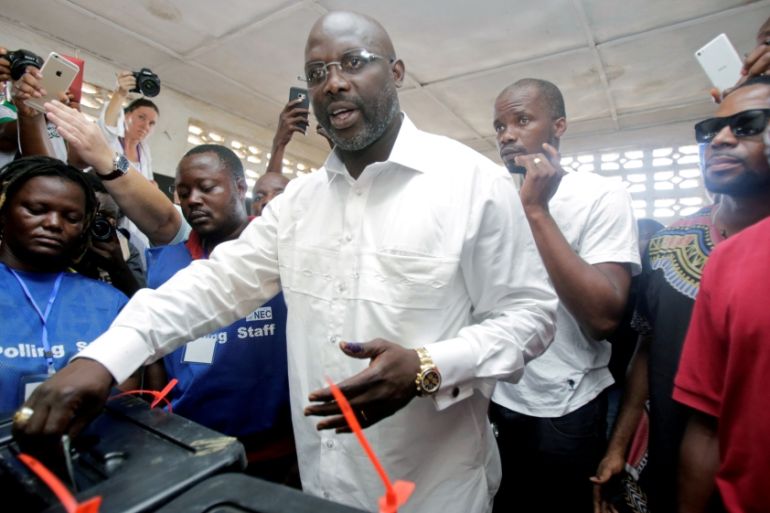Liberia elections: Run-off vote set for December 26
The poll, delayed for weeks, pits former international footballer George Weah against Vice President Joseph Boakai.

Liberia will hold a delayed presidential run-off vote on December 26, electoral officials have said.
Tthe National Elections Commission (NEC) made the announcement in a press briefing on Tuesday, saying official campaigning must end by December 24.
Keep reading
list of 4 itemsBehind India’s Manipur conflict: A tale of drugs, armed groups and politics
Solomon Islands prepares for ‘most important election since independence’
Six takeaways from first day of Trump’s New York hush money criminal trial
“We call on the two political parties in the run-off election … to go about their campaign in a peaceful manner,” said Jerome Korkoya, NEC chairman.
A run-off was originally scheduled for last month between George Weah, an international football star-turned-politician, and Vice President Joseph Boakai.
The two presidential candidates ranked first and second respectively in the first round on October 10.
However, neither 51-year-old Weah, of the Coalition for Democratic Change, nor 73-year-old Boakai, of the ruling Unity Party, scored more than the 50 percent needed to win outright.
Read our interview with Jewel Howard-Taylor, Weah’s running mate and ex-wife of Charles Taylor, a former Liberian president serving a 50-year prison sentence for crimes against humanity, here.
|
|
On November 6, a day before the scheduled poll, Liberia’s Supreme Court said the election would not go ahead until a legal challenge, alleging voter fraud and irregularities by the third-placed Liberty Party, was resolved.
Liberty Party was calling for a re-run of the first round, but its complaint was dismissed last week by the country’s top court.
The winner of the December 26 poll will succeed President Ellen Johnson Sirleaf, Africa’s first elected head of state who is stepping down after 12 years in office.
If the run-off goes smoothly, it will result in the first peaceful handover of power from one democratically elected leader to another in 73 years.
In 2011, Sirleaf was a joint recipient of the Nobel Peace Prize for her “non-violent struggle for the safety of women and for women’s rights to full participation in peace-building work” in the wake of Liberia’s bloody 14-year civil war, which ended in 2003.
She has made it clear that she wishes to hand over power to a democratically elected president when her time in office comes to an end on January 15, 2018.
![Boakai is the presidential candidate of the ruling Unity Party [File: Thierry Gouegnon/Reuters]](/wp-content/uploads/2017/12/8d0a1f9ad2224d74ace89699d49fd8be_18.jpeg)